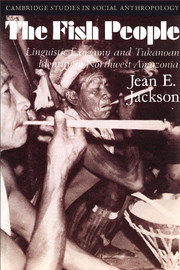Book contents
- Frontmatter
- Contents
- List of figures, maps, and tables
- Preface
- Acknowledgments
- Note on orthography
- 1 Purpose and organization of the book
- 2 Introduction to the Central Northwest Amazon
- 3 The longhouse
- 4 Economic and political life
- 5 Vaupés social structure
- 6 Kinship
- 7 Marriage
- 8 Tukanoans and Makú
- 9 The role of language and speech in Tukanoan identity
- 10 Male and female identity
- 11 Tukanoans' place in the cosmos
- 12 Tukanoans and the outside world
- 13 Conclusions: themes in Tukanoan social identity
- Notes
- Glossary
- References
- Index
- CAMBRIDGE STUDIES IN SOCIAL ANTHROPOLOGY
12 - Tukanoans and the outside world
Published online by Cambridge University Press: 05 June 2012
- Frontmatter
- Contents
- List of figures, maps, and tables
- Preface
- Acknowledgments
- Note on orthography
- 1 Purpose and organization of the book
- 2 Introduction to the Central Northwest Amazon
- 3 The longhouse
- 4 Economic and political life
- 5 Vaupés social structure
- 6 Kinship
- 7 Marriage
- 8 Tukanoans and Makú
- 9 The role of language and speech in Tukanoan identity
- 10 Male and female identity
- 11 Tukanoans' place in the cosmos
- 12 Tukanoans and the outside world
- 13 Conclusions: themes in Tukanoan social identity
- Notes
- Glossary
- References
- Index
- CAMBRIDGE STUDIES IN SOCIAL ANTHROPOLOGY
Summary
No phrase captures so well what Tukanoans face in their present and future contacts with the outside world as the subtitle of Erving Goffman's book Stigma: The Management of Spoiled Identity (1963). Although the degree and nature of change vary greatly from region to region in the Vaupés, it is apparent to all but the most ethnocentric change agents (regardless of the particular type of change being promulgated) that Tukanoans have suffered greatly from disturbances in their traditional culture. Although the situation in the Vaupés may be better than in most of Amazonia, as Corry (1976) maintains, in my opinion Tukanoans face a bleak future.
In the vast majority of cases the results of regular contact between a small-scale society and a powerful colonizing one are massive, far-reaching, and for the most part negative. This has been well documented for hundreds of band and tribal societies (Bodley, 1975); Tukanoan society is no exception.
Some of the changes in the society resulting from contact with outsiders have been mentioned in previous chapters. Diseases introduced by outsiders brought death and out-migration, reducing the size of local groups so drastically that some customs and institutions have disappeared owing to lack of people to fill the required roles.
The effects of an expanding, development-oriented national and international economy on local systems like the one in the Vaupés are, with few exceptions, devastating (Davis, 1977).
- Type
- Chapter
- Information
- The Fish PeopleLinguistic Exogamy and Tukanoan Identity in Northwest Amazonia, pp. 211 - 226Publisher: Cambridge University PressPrint publication year: 1983

